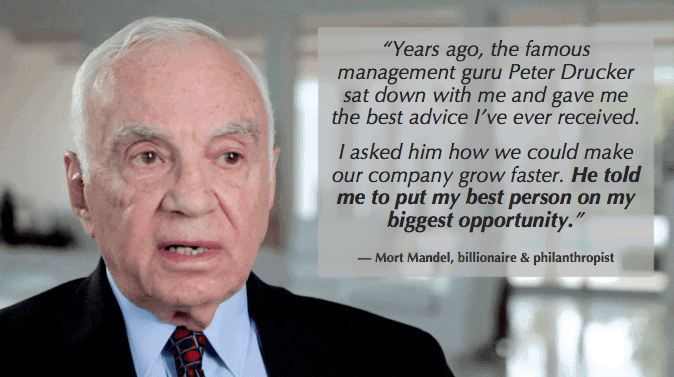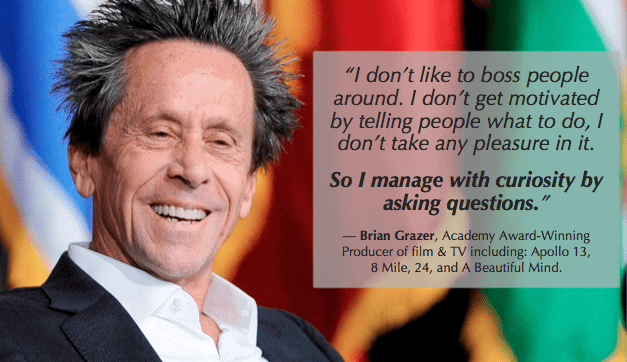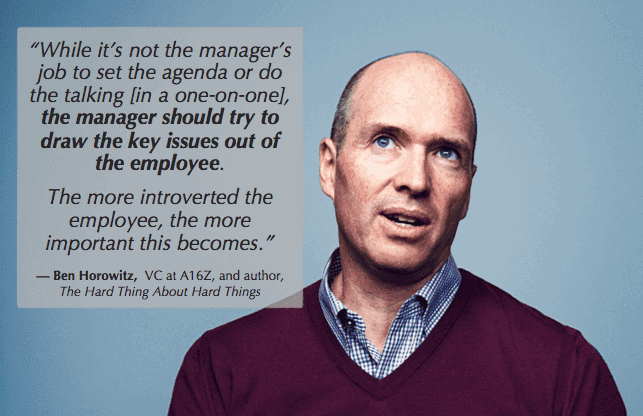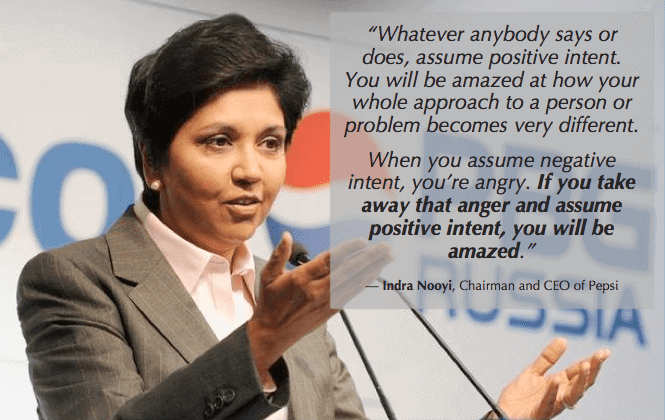Ask 5 people what makes a good manager, and you'll get a list of at least a dozen characteristics. Yet, if you wanted to project success for them, there is one management skill that rises above the others: curiosity.
Here's why:
Curiosity is a mindset, and it is a skill. The art of asking the right questions can make all the difference in a manager's success or failure no matter the stage in their career.
Learn from a legend.
Billionaire Mort Mandel learned this critical lesson from leadership legend Peter Drucker. In Mandel's autobiography, "It's All About Who" he shares the following story:
That simple answer probably feels a bit like something Captain Obvious would tell you. How helpful is it?
Well, after hearing that advice, Mandel was as skeptical as you, so he followed up with another question:
"If my best person is a dentist, would I put him in charge of running a brass foundry?"
Mandel figured he'd be able to stump Drucker with this extreme situation, but Drucker took no time to insightfully respond:
"Yes. Let me tell you what that dentist will do if he's your best person. He'll walk into that building, tour the plant, and speak to the employees. He'll immediately realize he doesn't know anything about a brass foundry. But he's going to get his people together and figure it out.
He'll try to find someone on that team who is highly qualified to run the plant. If he doesn't come up with one, he'll find the best foundry man in the country. The dentist will soon learn how to improve the leadership and the culture and reinforce the values."
I bet you can imagine the dentist doing all those things around the plant. And as they do, the dentist will be asking critical questions like:
- What's working well at the foundry right now?
- What could we do to improve your work area?
- What's management missing that matters?
- Who is the best leader among the staff? Why?
- Who is the best foundry man in the industry?
It is the act of listening and asking good questions to the right people that will turn the dentist into the leader the foundry needs. They'll discover the problems plaguing the foundry, what's working well, and help find the right people to appoint as leaders. While the dentist would never succeed on their knowledge alone, by using questions and curiosity they can forge a path to success.
Be inquisitive when you start a new role.
Like many of us, when put in a new role, the dentist didn't know much about their new job. However, asking the right people the right questions quickly changed the situation for them and can do the same for you and your team.
Learning by experience alone does not scale as a leader. Your best hope is to become great at asking questions to learn from others.
But curiosity isn't just for when you start. It's a habit you should never stop, regardless of your leadership role and experience level.
Why Asking Great Questions is a Critical Management Skill
Many of the best leaders in the world have learned this lesson and shared it with others. Here are some of our favorite quotes from leaders at companies like Pepsi, Pixar, and Intel, as well as a legendary Hollywood producer.
1) Bossing people around misses out on a ton of learning.
Brian Grazer is a legendary Hollywood producer you probably have never heard of, but you've definitely heard of the movies he's helped make make. He's been working for decades with director and long time friend, Ron Howard, on films like A Beautiful Mind and Apollo 13.
In his book, "A Curious Mind" he reveals how he's learned so much in his career by asking questions. He's used it to meet and learn from brilliant and famous people including multiple US Presidents, Michael Jackson, and Princess Diana.
He's also used his curiosity to inform his management style, which he describes in his book:
"I especially think questions are a great management tool when I think someone isn't doing what I would hope they would, or when I think something isn't going in the direction I want it to go.
...
Asking questions creates the space for people to raise issues they are worried about that the boss, or their colleagues, may not know about.
Asking questions gives people the chance to tell a different story than the one you're expecting.
Most important from my perspective is asking questions means people have to make their case for the way they want a decision to go."
Rather than being the boss, and telling everyone how to do things, Grazer uses questions to listen and learn. When his team answers them, sometimes Brian changes his mind, and other times, the act of answering changes theirs. Either way, the outcome has nothing to do with Brian's ego or his ideas being the only way to do things.
Brian doesn't mind sacrificing his ego, because his real goal is to make a great work of art. The result of his approach speaks for itself: he has 43 Academy Award nominations and 149 Emmy nominations.
Don't be bossy; ask questions when you see something wrong and use the answers to shape a better path forward.
2) Problems don't come to you. You have to seek them out by asking.
Pixar Animation Studios has been making hit animated films for the last 20 years. This hot streak is no mistake. It is the careful attention to a hard working, candid culture, that has helped them succeed.
At the helm of this culture is co-founder Ed Catmull. In his book, Creativity, Inc, he shares many lessons on how he architected the culture and improved it as they grew and changed. One major lesson he learned early on that he wrote about in his book was that leaders must seek out problems:

During the arduous journey to make Toy Story, he never once heard about issues production managers were having. When he finally did find out about them, he felt horrible they had gone on for so long. It was a painful lesson he learned that shaped much of his management approach going forward.
After Toy Story was a big success and the future of Pixar seemed secure after so many years of struggling, Catmull was looking for his next challenge. That turned out to be focusing on Pixar's leadership and culture. Reflecting on how he and other leaders have risen to that challenge over the years, he wrote:
"What makes Pixar special is that we acknowledge we will always have problems, many of them hidden from our view; that we work hard to uncover these problems, even if doing so means making ourselves uncomfortable; and that, when we come across a problem, we marshal all of our energies to solve it. This more than any elaborate party or turreted workstation, is why I love coming to work in the morning. It is what motivates me and gives me a definite sense of mission."
Building a great culture in your company or on your team does not happen by accident. It is only by hard work setting a good example and actively seeking out problems that you will find the changes you need to make for your team to perform at their highest possible levels.
These problems do not come to you. You must seek them out.
3) Questions level the playing field.
No matter the role you're in, as your team grows, you'll work with many different personalities. One of the risks you run as your team grows is that you can be dominated by your extroverts.
As the saying goes, "the squeaky wheel gets the grease." If you're not careful, you'll end up having your most outspoken team members driving your decisions and changes you make on the team's behalf. This is why it's important to ask questions of everyone on your team, even if they aren't coming to you or readily volunteering information.
One of the best places to ask questions is in your one on ones with each person on your team. These meetings are invaluable for many reasons, and Ben Horowitz, VC and author of The Hard Thing About Hard Things points out a crucial one:
You have to ask your introverts. Draw the answers and insights out of them. (Ed. note: these one on one questions can help if you're looking for ideas on what to ask.)
It can be hard work, but it's critical to getting their input. They can help you fully understand what problems or opportunities exist.
And even if someone on your team does come to you with something, don't just take it at face value. You should probe deeper so you fully understand the situation, idea, or feedback.
That's why Andy Grove, former CEO and founder of Intel has, "Grove's Principle of Didactic Management", which he writes about in his leadership classic, High Output Management:
"When the supervisor thinks the subordinate has said all he wants to about a subject, he should ask another question. He should try to keep the flow of thoughts coming by prompting the subordinate with queries until both feel satisfied they have gotten to the bottom of the problem."
If you know the 5 Why's method to get to the root of a problem, consider this the sibling to that approach.
Never assume you fully understand something from simply an initial statement. You need to probe deeper so you're not treating symptoms without knowing the disease.
For example, someone may tell you they want to be involved in a meeting they hadn't been attending before. The easy answer would be to just invite them along and move on.
However, if you probe deeper, you may discover the reason they want to be there has little to do with the meeting. Instead, it could be due to a feeling of being out of the loop, not having input where they feel they should, or that they want to impress someone in the meeting. All 3 of those would have different ideal solutions and be worthy of much more discussion to determine the best approach.
Whether your team member is starting the discussion or you are, it's important bring questions and keep asking questions so you get the full story regardless of their personality.
4) Questions prevent rushing to judgment.
When you hear bad news or about a problem, it's easy to jump to conclusions and want to take action quickly. However, if you do that, it's easy to say or do things you'll regret later. That's why Indra Nooyi, CEO of Pepsi, takes a different approach:
When you assume positive intent, and come to those involved in a situation with good questions to learn more, you'll be in a much better position. Not only do you avoid making any ill advised decisions, you can diffuse the situation by not escalating tensions. As Nooyi wrote:
"Sometimes in the heat of the moment, people say things. You can either misconstrue what they're saying and assume they are trying to put you down, or you can say, "Wait a minute. Let me really get behind what they are saying to understand"...when you assume positive intent, I think what often happens is the other person says, "Hey, wait a minute, maybe I'm wrong in reacting the way I do because this person is really making an effort."
And it goes deeper. When you take a positive approach and use questions to learn more, you make mistakes safe to occur, and for you to be told about them.
The downward spiral of rushing to judgment.
If you have a habit of killing the messenger, no one will come to you with problems for long. Similarly, if a you tend to explode over any problem, your team will quickly learn to avoid making any mistakes. Both are catastrophic for you and your team.
If everyone is afraid to come to you with problems, then many issues will fester and force you into a fire fighting, reactionary management mode. Once you're there, it's quite easy to get trapped as a new, major problem will likely be emerging just as you dealt with the last one.
Meanwhile, if your team is afraid to make mistakes and take risks, you will never discover breakthrough opportunities, and creativity will be stymied. This is a recipe for your best people to leave and your team as a whole to underperform.
Be a thoughtful manager. Give people the benefit of the doubt and use questions to get all the facts before rushing to a decision.
5) Questions help you learn your people's motivations.
Many people want to "be the boss," but no one likes being bossed around. You have to tap into people's motivations to get the best work out of them.
It's why a core part of Dale Carnegie's leadership classic, How to Win Friends and Influence People, has this simple, yet important lesson:
Later in How to Win Friends, Carnegie relays the following story about how a plant manager got his employees to step up to help deliver a massive order that he originally thought was impossible to do with their other order commitments:
"Instead of pushing his people to accelerate their work and rush the order through, he called everyone together, explained the situation to them, and told them how much it would mean to the company and to them if they could make it possible to produce the order on time. Then he started asking questions:
- Is there anything we can do to handle this order?
- Can anyone think of different ways to process it through the shop that will make it possible to take the order?
- Is there any way to adjust hours or personnel assignments that would help?"
Because the plant manager came to his people and involved them in the decision, they rallied with him and helped create a way to deliver the order on time. If he had simply come out and started giving orders, he would have likely been met with groans and resistance instead.
As Carnegie later wrote, "Asking questions not only makes an order more palatable; it often stimulates the creativity of the persons whom you ask. People are more likely to accept an order if they have had a part in the decision that caused the order to be issued."
Do you know what excites your team? Do you engage or order them?
The only way to get anyone to do anything is if they want to do it. The only way to know what they want is to ask.
---
Questions are at the core of every facet of succeeding as a manager. If you want to develop your management skills, hone your curiosity.
Looking for helpful questions to ask? Here's a few for further reading:
- Over 100 One on One Meeting Questions for Managers to Ask their Teams
- Questions to ask when joining a new team
- 6 Questions Google Uses to Measure the Effectiveness of Their Managers
How to improve management skills?
One of the best ways to improve management skills is to stay curious. Curiosity is a mindset, and it is a skill. The art of asking the right questions can make all the difference in a manager's success or failure no matter the stage in their career.
Asking Great Questions is critical to improve your management skills. Many of the best leaders in the world have learned this lesson and shared it with others.
Rather than being the boss, and telling everyone how to do things, legendary Hollywood producer Brian Grazer uses questions to listen and learn. When his team answers them, sometimes Brian changes his mind, and other times, the act of answering changes theirs.
What are five qualities or skills a manager should have?
Five qualities and skills or skills a manager should have are:
- Learning instead of bossing people around.
- Problems don't come to you. You have to seek them out by asking.
- Asking questions levels the playing field.
- Asking questions prevents rushing to judgment.
- Questions help you learn your people's motivations.
What is the most important managerial skill?
Asking Great Questions is a most important managerial skill. Many of the best leaders in the world have learned this lesson and shared it with others.
Curiosity is a mindset, and it is a skill. The art of asking the right questions can make all the difference in a manager's success or failure no matter the stage in their career.
Rather than being the boss, and telling everyone how to do things, legendary Hollywood producer Brian Grazer uses questions to listen and learn. When his team answers them, sometimes Brian changes his mind, and other times, the act of answering changes theirs.
How do you develop management skills?
A great way to develop you management skills is to stay curious. Curiosity is a mindset, and it is a skill. The art of asking the right questions can make all the difference in a manager's success or failure no matter the stage in their career.
Asking Great Questions is critical to improve your management skills. Many of the best leaders in the world have learned this lesson and shared it with others.
What managers should improve?
Managers should improve their curiosity. Curiosity is a mindset, and it is a skill. The art of asking the right questions can make all the difference in a manager's success or failure no matter the stage in their career.
Asking Great Questions is critical to improve your management skills. Many of the best leaders in the world have learned this lesson and shared it with others.








